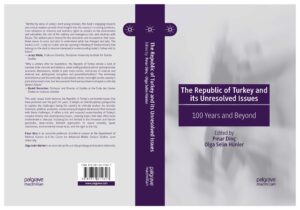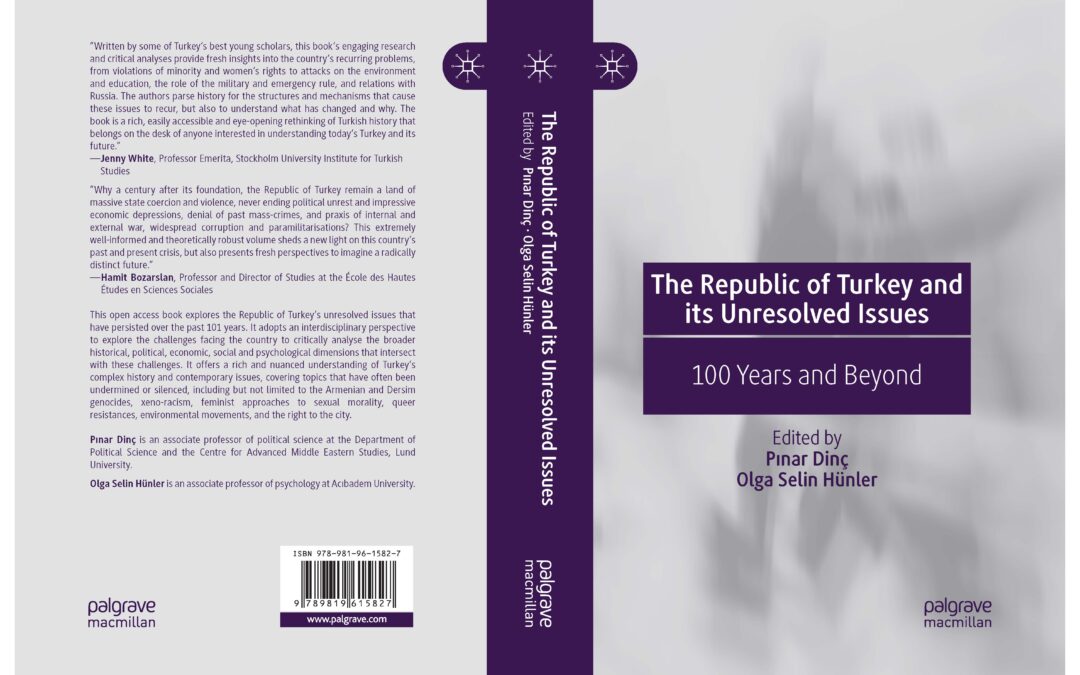We are thrilled to announce the release of our new, open-access edited book, The Republic of Turkey and its Unresolved Issues: 100 Years and Beyond (eds. Pınar Dinç & Olga Selin Hünler).

Access: https://link.springer.com/book/10.1007/978-981-96-1583-4
ACKNOWLEDGEMENTS
We would like to express our gratitude to the institutions and individuals who have facilitated the realisation of this project. We would like first to thank the Swedish Institute for providing financial support to the Turkey Beyond Borders project over four consecutive years. This has enabled us to establish an independent and academically free platform, which is particularly important given the ongoing decline in freedom of academic and cultural expression, research and teaching, academic exchange and dissemination, institutional autonomy, and campus integrity in Turkey. It has been a great pleasure to collaborate with the IPS Communication Foundation (Bianet) on the Turkey Beyond Borders project from 2022 to 2024. We extend our heartfelt thanks to Nadire Mater and the entire Bianet team for their invaluable contributions to the project. It is our sincere wish that these initiatives, along with civil society organisations and media platforms tirelessly advocating for Turkey’s democratisation and human rights, continue to receive the support they need to achieve their goals.
We would like to express our gratitude to the Centre for Advanced Middle Eastern Studies (CMES) at Lund University and the Middle East and North Africa programme at the Swedish Institute of International Affairs (UI) for their hospitality and support in hosting this project since 2020. We would like to acknowledge to the Middle East in Contemporary World (MECW) strategic research area at CMES for covering the copy-editing expenses related to this publication. Additionally, we acknowledge Lund University for its financial support in making this book available in an open-access format. We would like to express our gratitude to James Root for his exemplary work as a copy editor. His meticulous approach was invaluable in ensuring the accuracy and quality of this publication. Palgrave Macmillan and its editorial team have been highly supportive and understanding throughout the entire process, from the initial proposal to the completion of production, for which we are extremely grateful. We would like to express our gratitude to our valued colleague Bilge Yabancı, for providing us with invaluable feedback on our book proposal.
Heartfelt thanks to our family and friends for their invaluable support in the management of the Turkey Beyond Borders project and the prepa-ration of this publication. We would like to extend our gratitude to Demet Yi˘gitba¸s, Bahar Yi˘gitba¸s, Beycan Mura, Derya, Pikan Ajans, Volkan Muyan, and all who contributed to Turkey Beyond Borders throughout these years. We thank Neil Patrick Doherty for allowing us to use his English translations of the two poems we use in this book. We are grateful to Kerem Öktem and Volkan Çıdam for their valuable comments on this introduction. Heartfelt thanks to our beloved ones, Bade and Volkan, for the love and light they bring to our lives. Finally, we would like to express our gratitude to the members of the Advisory Board, our colleagues, and the broader community of followers and supporters of the Turkey Beyond Borders project, including students, academics, journal-ists, experts, and other individuals. It is our sincere hope that this book will not be regarded as the conclusion of the Turkey Beyond Borders, but rather as a contribution towards the ongoing pursuit of the project’s objectives.
In Yearning: Race, Gender, and Cultural Politics (1990, p. 215) bell hooks writes, “true resistance begins with people confronting pain, whether it’s theirs or somebody else’s, and wanting to do something to change it”. We dedicate this book to all the remarkable people who, with admirable determination, resilience, and unwavering integrity, continue their struggle for change and a more just and equal future.
Table of Contents
Introduction by the Editors – Pınar Dinç and Olga Selin Hünler
PART I: Who Owns the Republic of Turkey?
Turkish Supremacy and Its Discontents: Minorities and Majorities in the Turkish Republic – Kerem Öktem
Crime and Non-punishment: Legacies of Genocide and Denial in Turkey – Nazan Maksudyan
Dersim: A Century of State-Led Destruction and Resistance – Pınar Dinç
The Scholarly Subject of the “Kurdish Question”: Knowledge, Resilience and Gender – Bahar Şimşek
Transnational Alevism: Shaping Identity, Community and Recognition Across Borders – Hayal Hanoğlu
The Rise of Xeno-Racism in Turkey: The Transformation of Racism in the Context of Migration – Lülüfer Körükmez
PART II: Remembering the Past, (Re-)imagining the Future
Fractures in Dominant Republican Memory: The 2000s, the Memory Turn and Memory Activism in Turkey – Göze Orhon
Confronting the Shadows: Transitional Justice and the Armenian Genocide in Turkey – Nisan Alıcı
Emancipatory Space of the Political and Social Movements: Bodies, Meetings, and Street Protests – Özgür Sevgi Göral
PART III: Resistance of the Peoples
Feminist Approaches to Sexual Morality in Turkey – Aslı Zengin
Traitors, Terrorists, & Çapulcus:Protests and the Limits of Democratic Politics in Turkey’s First Century and Beyond – T. Deniz Erkmen
Turkey’s Queer Struggle: Digital Media and Nightlife as the New Frontiers – Yener Bayramoğlu
What Does It Mean to Win? Revisiting Environmental Movements in Turkey –
Cem İskender Aydın and Ethemcan Turhan
Urban Politics in the Republic of Exceptions: Politics of Informal Housing in Istanbul – Mert Arslanalp
PART IV: Structural Problems of the Republic
Political Economy in Turkey: Between Continuity and Break – Bengi Akbulut
Autocratisation Through Emergency Rule – Serdar Tekin
Higher Education Reforms: A Century of State Interventions in Turkish Higher Education – Olga Selin Hünler
The Military in Turkish Politics: The Centennial Balance Sheet and the Legacy for the Next Century – İsmet Akça
Turkey–Russia Relations: Not an Alternative to the West but a Balancer – Mühdan Sağlam
In Lieu of an Afterword

